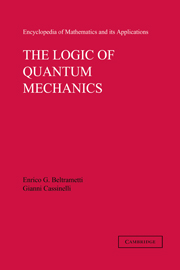Book contents
- Frontmatter
- Contents
- Editor's Statement
- Foreword
- Preface
- The Logic of Quantum Mechanics
- Part I HILBERT-SPACE QUANTUM MECHANICS
- Part II BASIC STRUCTURES IN THE DESCRIPTION OF QUANTUM SYSTEMS
- Chapter 10 The Typical Mathematical Structure of Propositions: Orthomodular AC Lattices
- Chapter 11 Probability Measures on Orthomodular Posets and Lattices
- Chapter 12 Characterization of Commutativity
- Chapter 13 States and Propositions of a Physical System
- Chapter 14 Quantum-Mechanical Features in Terms of the Logic of the Physical System
- Chapter 15 On the Hidden-Variables Issue
- Chapter 16 Proposition-State Structure and Idealized Measurements
- Chapter 17 Superpositions of States and Closure Spaces
- Chapter 18 Transition-Probability Spaces and Quantum Systems
- Chapter 19 On the Convex-Set Approach
- Chapter 20 Introduction to a Quantum Logic
- Part III RECONSTRUCTION OF HILBERT-SPACE QUANTUM MECHANICS
- Appendix A Trace-Class Operators
- Appendix B The Spectral Theorem
- Appendix C Proofs for Chapter 11
- Subject Index
- Miscellaneous Endmatter
Chapter 15 - On the Hidden-Variables Issue
Published online by Cambridge University Press: 05 June 2013
- Frontmatter
- Contents
- Editor's Statement
- Foreword
- Preface
- The Logic of Quantum Mechanics
- Part I HILBERT-SPACE QUANTUM MECHANICS
- Part II BASIC STRUCTURES IN THE DESCRIPTION OF QUANTUM SYSTEMS
- Chapter 10 The Typical Mathematical Structure of Propositions: Orthomodular AC Lattices
- Chapter 11 Probability Measures on Orthomodular Posets and Lattices
- Chapter 12 Characterization of Commutativity
- Chapter 13 States and Propositions of a Physical System
- Chapter 14 Quantum-Mechanical Features in Terms of the Logic of the Physical System
- Chapter 15 On the Hidden-Variables Issue
- Chapter 16 Proposition-State Structure and Idealized Measurements
- Chapter 17 Superpositions of States and Closure Spaces
- Chapter 18 Transition-Probability Spaces and Quantum Systems
- Chapter 19 On the Convex-Set Approach
- Chapter 20 Introduction to a Quantum Logic
- Part III RECONSTRUCTION OF HILBERT-SPACE QUANTUM MECHANICS
- Appendix A Trace-Class Operators
- Appendix B The Spectral Theorem
- Appendix C Proofs for Chapter 11
- Subject Index
- Miscellaneous Endmatter
Summary
The Question of the Completeness of Quantum Mechanics
When a classical system is in a pure state, that is, when its preparation represents maximal information, the value of every physical quantity is uniquely predicted. In other words, classical pure states are dispersion-free, and classical mechanics is deterministic. Only in case the state is nonpure, thus representing nonmaximal information about the system, does probability enter into the theory.
Things are different with quantum systems. Even in case the state of the system is pure, it is impossible to predict a definite value of every physical quantity: only the probability distributions of the physical quantities are given. Pure quantum states have dispersion (though, of course, they can be dispersion-free for particular physical quantities), and probability enters into quantum theory at a much more fundamental level.
The basic idea of so-called hidden-variable theories is to reject the fundamental role of probability in quantum theory and to argue that probability arises because quantum states, even the pure ones, do not represent the ultimate information about the system. Accordingly, it is conjectured that there are certain hidden variables, not yet subject to experimental detection, which would complete the information carried by the quantum states, thus giving rise to so precise a knowledge of the system that probabilities would disappear and precise values of all physical quantities would be uniquely determined.
- Type
- Chapter
- Information
- The Logic of Quantum Mechanics , pp. 171 - 176Publisher: Cambridge University PressPrint publication year: 1984



